 At Hillary Clinton's urging, and with American logistical support, NATO launched 9700 "strike sorties" against Libya of which more than a third were aimed at civilian targets.
At Hillary Clinton's urging, and with American logistical support, NATO launched 9700 "strike sorties" against Libya of which more than a third were aimed at civilian targets.
-
 At Hillary Clinton's urging, and with American logistical support, NATO launched 9700 "strike sorties" against Libya of which more than a third were aimed at civilian targets.
At Hillary Clinton's urging, and with American logistical support, NATO launched 9700 "strike sorties" against Libya of which more than a third were aimed at civilian targets.
-
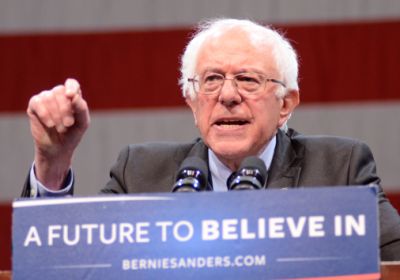 Democratic presidential candidate Bernie Sanders scored resounding caucus victories in Alaska, Hawaii, Idaho, Utah and Washington in recent days, TeleSUR English said on March 30. Recent polls show the self-proclaimed socialist has gained significant ground on Democrat establishment favourite Hillary Clinton, who pundits expected to have the nomination all but sewn up by now.
Democratic presidential candidate Bernie Sanders scored resounding caucus victories in Alaska, Hawaii, Idaho, Utah and Washington in recent days, TeleSUR English said on March 30. Recent polls show the self-proclaimed socialist has gained significant ground on Democrat establishment favourite Hillary Clinton, who pundits expected to have the nomination all but sewn up by now. -
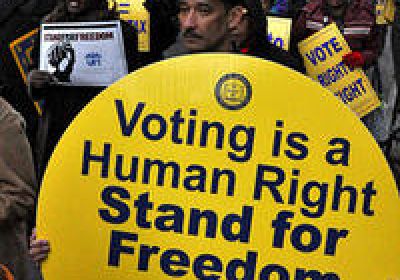 Protesters have demanded the reinstatement of the United States’ Voting Rights Act of 1965, a complete count of provisional ballots in Arizona’s March 22 presidential primaries and a public random recount of unsorted mail ballots in the state, Alternet.org said on March 28.
Protesters have demanded the reinstatement of the United States’ Voting Rights Act of 1965, a complete count of provisional ballots in Arizona’s March 22 presidential primaries and a public random recount of unsorted mail ballots in the state, Alternet.org said on March 28. -
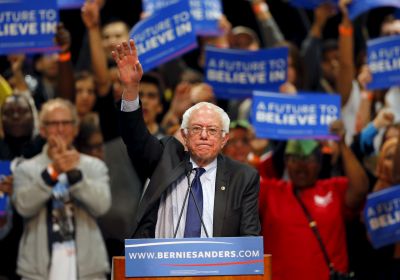
Democrat voters in Utah, Idaho, and Arizona have turned out in unprecedented numbers or March 22 caucuses, with self-proclaimed socialist Bernie Sanders winning big in Utah and Idaho, TeleSUR English said that day.
-
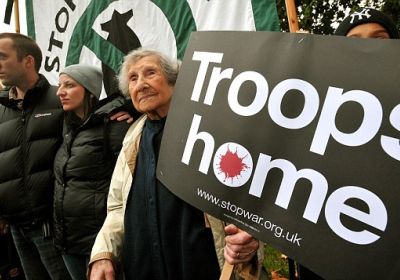 I have been filming in the Marshall Islands, which lie north of Australia, in the middle of the Pacific Ocean. Whenever I tell people where I have been, they ask, "Where is that?" If I offer a clue by referring to "Bikini", they say, "You mean the swimsuit." Few seem aware that the bikini swimsuit was named to celebrate the nuclear explosions that destroyed Bikini island. Sixty-six nuclear devices were exploded by the United States in the Marshall Islands between 1946 and 1958 -- the equivalent of 1.6 Hiroshima bombs every day for twelve years.
I have been filming in the Marshall Islands, which lie north of Australia, in the middle of the Pacific Ocean. Whenever I tell people where I have been, they ask, "Where is that?" If I offer a clue by referring to "Bikini", they say, "You mean the swimsuit." Few seem aware that the bikini swimsuit was named to celebrate the nuclear explosions that destroyed Bikini island. Sixty-six nuclear devices were exploded by the United States in the Marshall Islands between 1946 and 1958 -- the equivalent of 1.6 Hiroshima bombs every day for twelve years. -
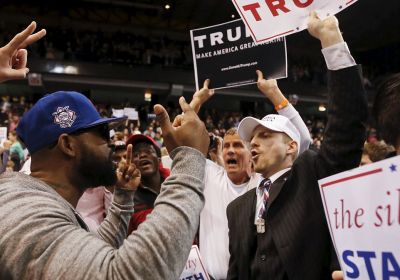 Amid growing incidents of violence at rallies for Donald Trump and protests confronting the Republican presidential frontrunner, the Republican Party’s establishment has opened a campaign to try to deny Trump the party’s presidential nomination. In a broadside attack on Trump, the Republican candidate in 2012 Mitt Romney launched a drive under the slogan “anyone but Trump.” He said a Trump presidency would be a disaster for “America” — strongly implying that voters should not support Trump in the general election if he wins the nomination. Republican fears
Amid growing incidents of violence at rallies for Donald Trump and protests confronting the Republican presidential frontrunner, the Republican Party’s establishment has opened a campaign to try to deny Trump the party’s presidential nomination. In a broadside attack on Trump, the Republican candidate in 2012 Mitt Romney launched a drive under the slogan “anyone but Trump.” He said a Trump presidency would be a disaster for “America” — strongly implying that voters should not support Trump in the general election if he wins the nomination. Republican fears -
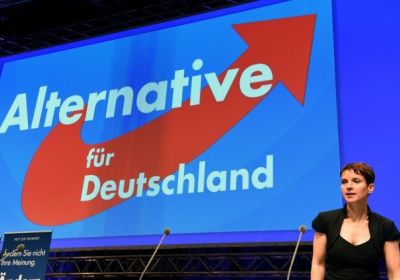 Although many readers are watching voting results in the United States with baited breath, it is worth taking a look at Germany's partial state elections on March 13. They are far from pleasant, but important all the same — and not just for Germany. Only three of Germany's 16 states voted, with national elections not due until 2017. But if the present trends continue, watch out.
Although many readers are watching voting results in the United States with baited breath, it is worth taking a look at Germany's partial state elections on March 13. They are far from pleasant, but important all the same — and not just for Germany. Only three of Germany's 16 states voted, with national elections not due until 2017. But if the present trends continue, watch out. -
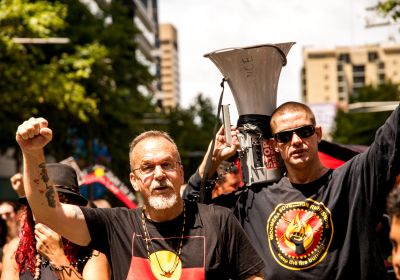 My name is Ken Canning. My traditional name is Burraga Gutya. My people are the Kunja clan of the Bidjara Nation of what is now called south-western Queensland. I was raised mainly on the coast of Queensland and in Brisbane and, although I have lived in Sydney since the late 1970s, I am still a very proud Murri. I have been fortunate that since living in Sydney the local Koori community has always taken me in and I feel very much at home here. Many First Nations peoples now living in Sydney are from all over this country and from many different nations.
My name is Ken Canning. My traditional name is Burraga Gutya. My people are the Kunja clan of the Bidjara Nation of what is now called south-western Queensland. I was raised mainly on the coast of Queensland and in Brisbane and, although I have lived in Sydney since the late 1970s, I am still a very proud Murri. I have been fortunate that since living in Sydney the local Koori community has always taken me in and I feel very much at home here. Many First Nations peoples now living in Sydney are from all over this country and from many different nations. -
 Freedom of speech in Turkey is deteriorating at a rate of knots. This week, a British academic was deported from the country with no trial and three academics were arrested, all accused of disseminating terrorist material. Earlier this month, Zaman — a widely-read newspaper critical of the regime — was seized and placed under control of a board of trustees by an Istanbul court.
Freedom of speech in Turkey is deteriorating at a rate of knots. This week, a British academic was deported from the country with no trial and three academics were arrested, all accused of disseminating terrorist material. Earlier this month, Zaman — a widely-read newspaper critical of the regime — was seized and placed under control of a board of trustees by an Istanbul court. -
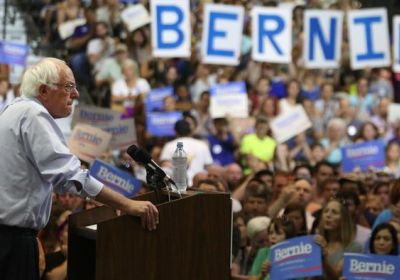 During the early days of his campaign to be US president, Democratic hopeful Bernie Sanders wondered if the crowds that he saw on the street were headed to a baseball game, only to be told: “Actually they are on the way to hear you”. This story illustrates how the Sanders message of free education, affordable health care, a $15 minimum wage, taxing the mega-rich and support for renewable energy has taken off. Young Americans — the millennials — facing unpayable student debts, unaffordable health care, low wages and climate change inaction, are flocking to his campaign.
During the early days of his campaign to be US president, Democratic hopeful Bernie Sanders wondered if the crowds that he saw on the street were headed to a baseball game, only to be told: “Actually they are on the way to hear you”. This story illustrates how the Sanders message of free education, affordable health care, a $15 minimum wage, taxing the mega-rich and support for renewable energy has taken off. Young Americans — the millennials — facing unpayable student debts, unaffordable health care, low wages and climate change inaction, are flocking to his campaign. -
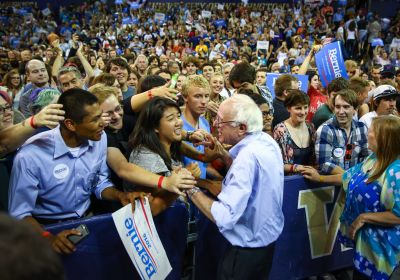 The media has trumpeted Democratic presidential hopeful Hillary Clinton’s apparently certain nomination after the March 15 caucuses, but the race is far from over. Tom Cahill writes, in a piece abridged from US Uncut, on why. * * *
The media has trumpeted Democratic presidential hopeful Hillary Clinton’s apparently certain nomination after the March 15 caucuses, but the race is far from over. Tom Cahill writes, in a piece abridged from US Uncut, on why. * * * -

Bernie Sanders has come out swinging after Donald Trump accused the self-proclaimed socialist contender in the Democrat primaries of paying his supporters to disrupt the leading Republican candidate's events.